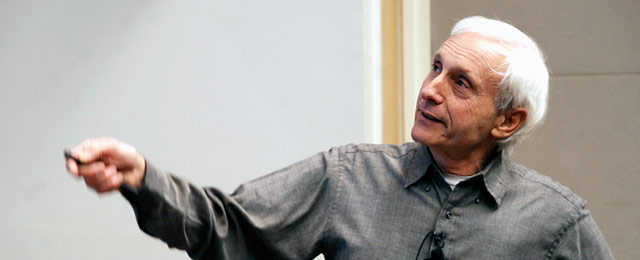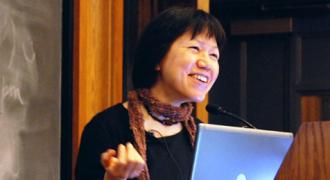Online courses directory (457)
This course explores stereotypes associated with Asian women in colonial, nationalist, state-authoritarian, and global/diasporic narratives about gender and power. Students will read ethnography, cultural studies, and history, and view films to examine the politics and circumstances that create and perpetuate the representation of Asian women as dragon ladies, lotus blossoms, despotic tyrants, desexualized servants, and docile subordinates. Students are introduced to the debates about Orientalism, gender, and power.
This subject explores the legal history of the United States as a gendered system. It examines how women have shaped the meanings of American citizenship through pursuit of political rights such as suffrage, jury duty, and military service, how those political struggles have varied for across race, religion, and class, as well as how the legal system has shaped gender relations for both women and men through regulation of such issues as marriage, divorce, work, reproduction, and the family. The course readings will draw from primary and secondary materials in American history, as well as some court cases. However, the focus of the class is on the broader relationship between law and society, and no technical legal knowledge is required or assumed.
Gender Through Comics: A Super MOOC is a Massive Open Online Course (MOOC) coming Spring 2013 that examines how comic books can be used to explore questions of gender identity, stereotypes, and roles. This highly engaging learning experience is designed for college-age and lifelong learners. The course, led by Christina Blanch of Ball State University, uses a study of comic books incorporating highly interactive video lectures, online discussions between students, and real-time socially driven interviews. Interviews with the comic industry's biggest names such as Terry Moore, Brian K Vaughan, Mark Waid, as well as others address questions of gender representations and constructions involving both men and women. To purchase the required materials for this course, please visit the Comixology page for Gender and Comic Books. View a video teaser about Gender Through Comic Books
After decades of efforts to promote development, why is there so much poverty in the world? What are some of the root causes of inequality world-wide and why do poverty, economic transformations and development policies often have different consequences for women and men? This course explores these issues while also examining the history of development itself, its underlying assumptions, and its range of supporters and critics. It considers the various meanings given to development by women and men, primarily as residents of particular regions, but also as aid workers, policy makers and government officials. In considering how development projects and policies are experienced in daily life in urban and rural areas in Africa, Latin America, Asia and Melanesia, this course asks what are the underlying political, economic, social, and gender dynamics that make "development" an ongoing problem world-wide.
This course seeks to examine how people experience gender - what it means to be a man or a woman - and sexuality in a variety of historical and cultural contexts. We will explore how gender and sexuality relate to other categories of social identity and difference, such as race and ethnicity, economic and social standing, urban or rural life, etc. One goal of the class is to learn how to critically assess media and other popular representations of gender roles and stereotypes. Another is to gain a greater sense of the diversity of human social practices and beliefs in the United States and around the world.
A survey of the history of economic development in the world in the past 300 years.
German 59: Holocaust in Film and Literature is a course that provides insight into the History of Holocaust and its pres
In this course students are exposed to history and culture of German-speaking countries through audio, video, and Web materials. It focuses on the expansion of basic communication skills and further development of linguistic competency, and includes the review and completion of basic grammar, building of vocabulary, and practice in writing short essays. Students will also read short literary texts.
For the first time in history, the global demand for freshwater is overtaking its supply in many parts of the world. The U.N. predicts that by 2025, more than half of the countries in the world will be experiencing water stress or outright shortages. Lack of water can cause disease, food shortages, starvation, migrations, political conflict, and even lead to war. Models of cooperation, both historic and contemporary, show the way forward. The first half of the course details the multiple facets of the water crisis. Topics include water systems, water transfers, dams, pollution, climate change, scarcity, water conflict/cooperation, food security, and agriculture. The second half of the course describes innovative solutions: Adaptive technologies and adaptation through policy, planning, management, economic tools, and finally, human behaviors required to preserve this precious and imperiled resource. Several field trips to water/wastewater/biosolids reuse and water-energy sites will help us to better comprehend both local and international challenges and solutions.
This survey course introduces students to the important and basic material on human fertility, population growth, the demographic transition and population policy. Topics include: the human and environmental dimensions of population pressure, demographic history, economic and cultural causes of demographic change, environmental carrying capacity and sustainability. Political, religious and ethical issues surrounding fertility are also addressed. The lectures and readings attempt to balance theoretical and demographic scale analyzes with studies of individual humans and communities. The perspective is global with both developed and developing countries included.
Ever wondered why some countries are rich and others poor? Or why some people believe hard work results in upward mobility and others don’t? To answer these questions, you need to “see” the world sociologically.
In this introductory sociology course, we will explore the concerns of an interconnected global world through classic sociological concepts. Through short lectures, interviews with prominent sociologists and everyday people around the world, you will learn to see your role in the scope of global history.
No previous experience needed.
Image: Ganesh Ramachandran | www.purpleganesh.com
This course offers an evidence-based analysis of globalization that addresses what is happening to us personally as well as economically amidst the market-led processes of global integration.
Who are the winners and losers of globalization? What should be done to improve outcomes for all?
This course will examine how the spread of trade, investment, and technology across borders affects firms, workers, and communities in developed and developing countries. It investigates who gains from globalization and who is hurt or disadvantaged by globalization. Global experts from public and private sectors share insights on current trends and challenges. Course participants will develop their global acumen and will learn about issues faced by leaders in today’s international business and public policy environment.
This course will focus on the myths of ancient Greece and Rome, as a way of exploring the nature of myth and the function it plays for individuals, societies, and nations.
The world is ageing – people are older and societies are facing hard realities. What are we to make our lives in this time of global ageing? In six weeks, we analyze critical questions about age and ageing around the world.
Learn about the ethical issues that arise when conducting human subjects research, as well as the history that grounds policies and debates in this area of biomedicine.
Learn how to identify effective nonprofit organizations and apply course concepts by awarding grants to student-nominated nonprofits.
Explore the archaeology of the most heavily fortified frontier in the Roman Empire, its people and their lives.
This course examines major works by Hemingway, Fitzgerald, and Faulkner, exploring their interconnections on three analytic scales: the macro history of the United States and the world; the formal and stylistic innovations of modernism; and the small details of sensory input and psychic life.
Warning: Some of the lectures in this course contain graphic content and/or adult language that some users may find disturbing.
In this course, we will study the emergence of the major civilizations of the ancient world, beginning with the Paleolithic Era (about 2.5 million years ago) and finishing with the end of the Middle Ages in fifteenth century A.D. We will pay special attention to how societies evolved across this expanse of timefrom fragmented and primitive agricultural communities to more advanced and consolidated civilizations. To do this, we will rely upon textbook readings to provide historical overviews of particular civilizations and then utilize primary-source documents to illuminate the unique features of these individual societies. By the end of the course, you will possess a thorough understanding of important overarching social, political, religious, and economic themes in the ancient world, ranging from the emergence of Confucian philosophy in Asia to the fall of imperial Rome. You will also understand how many aspects of these ancient civilizations continue to remain relevant in today’s world.
Trusted paper writing service WriteMyPaper.Today will write the papers of any difficulty.




















